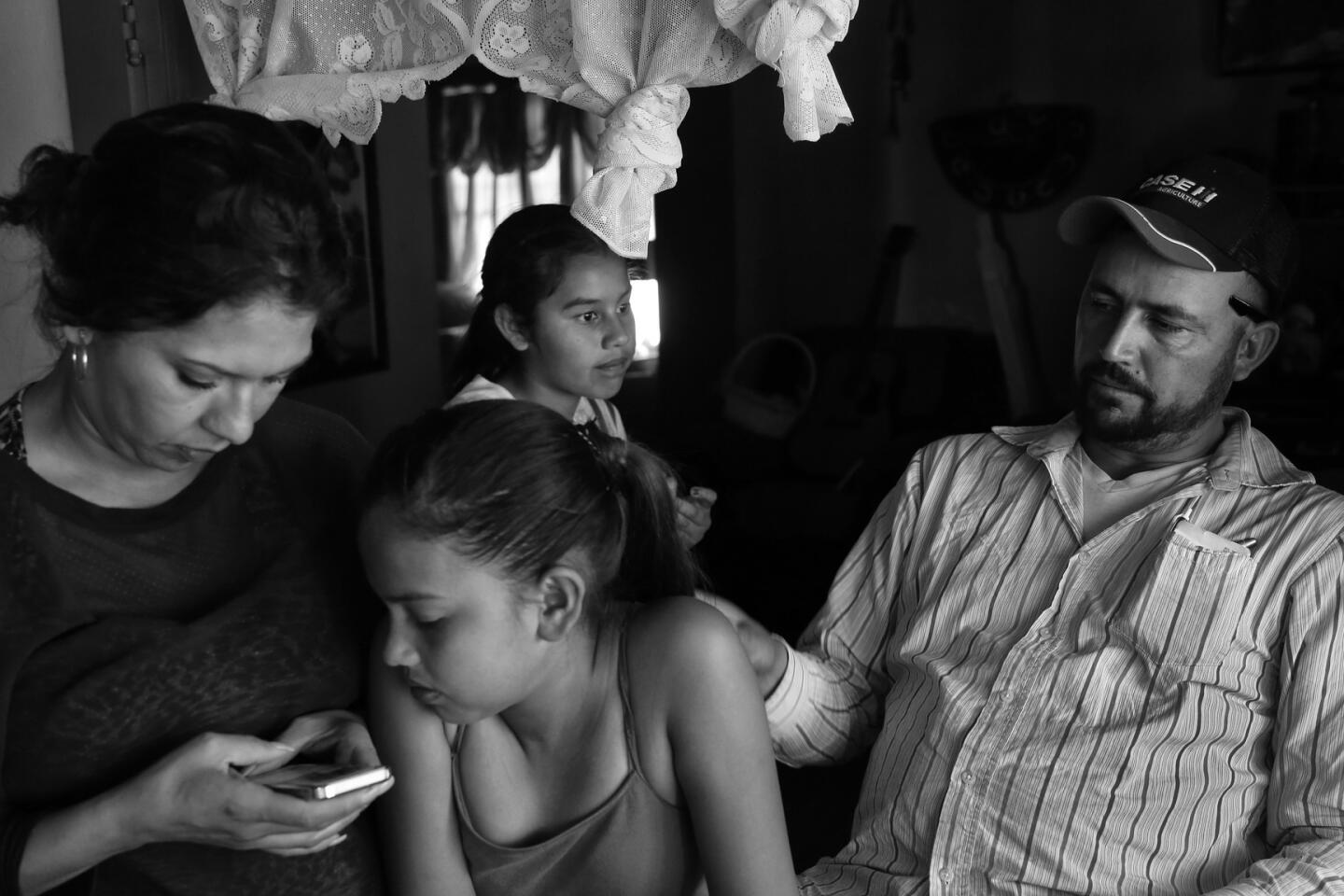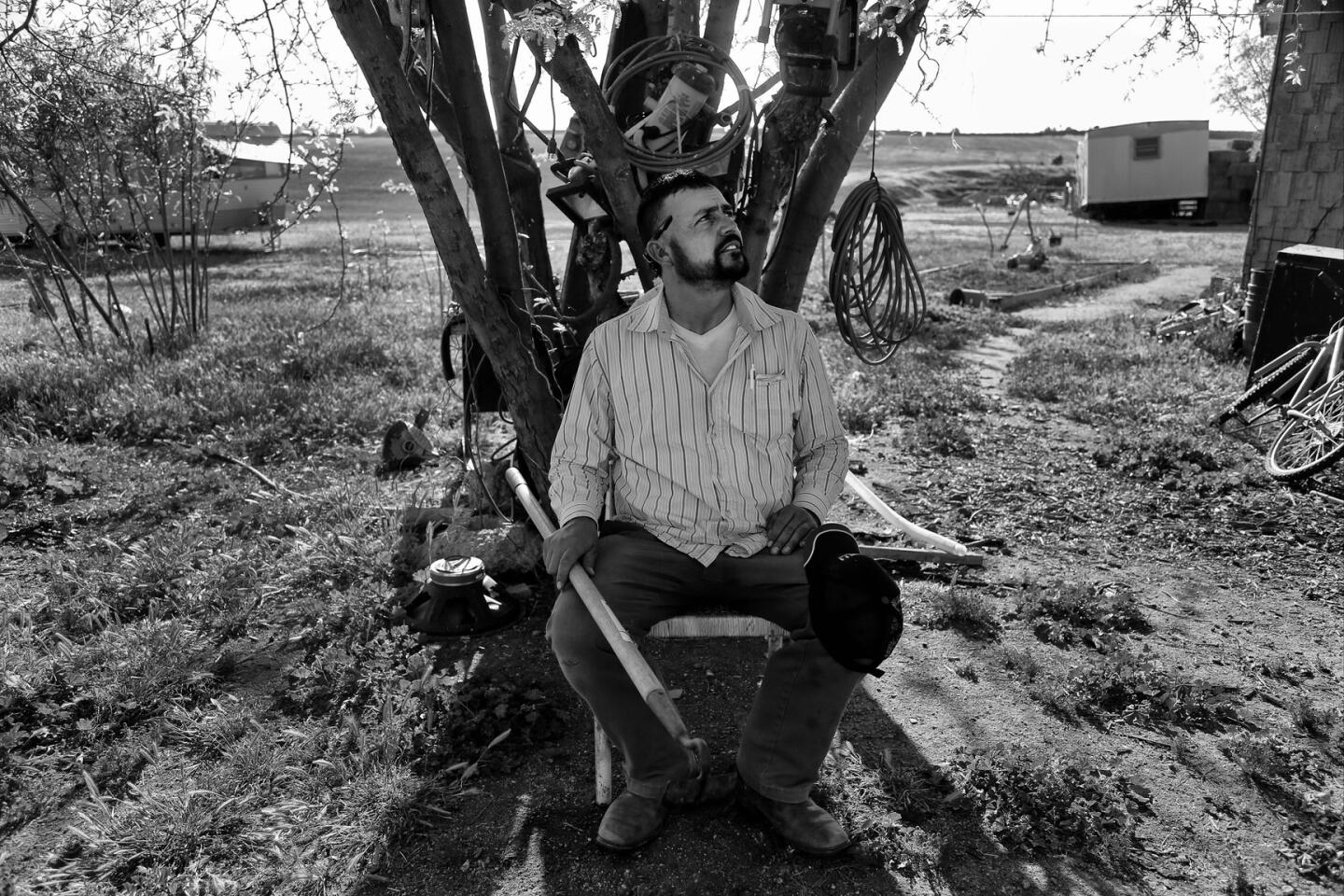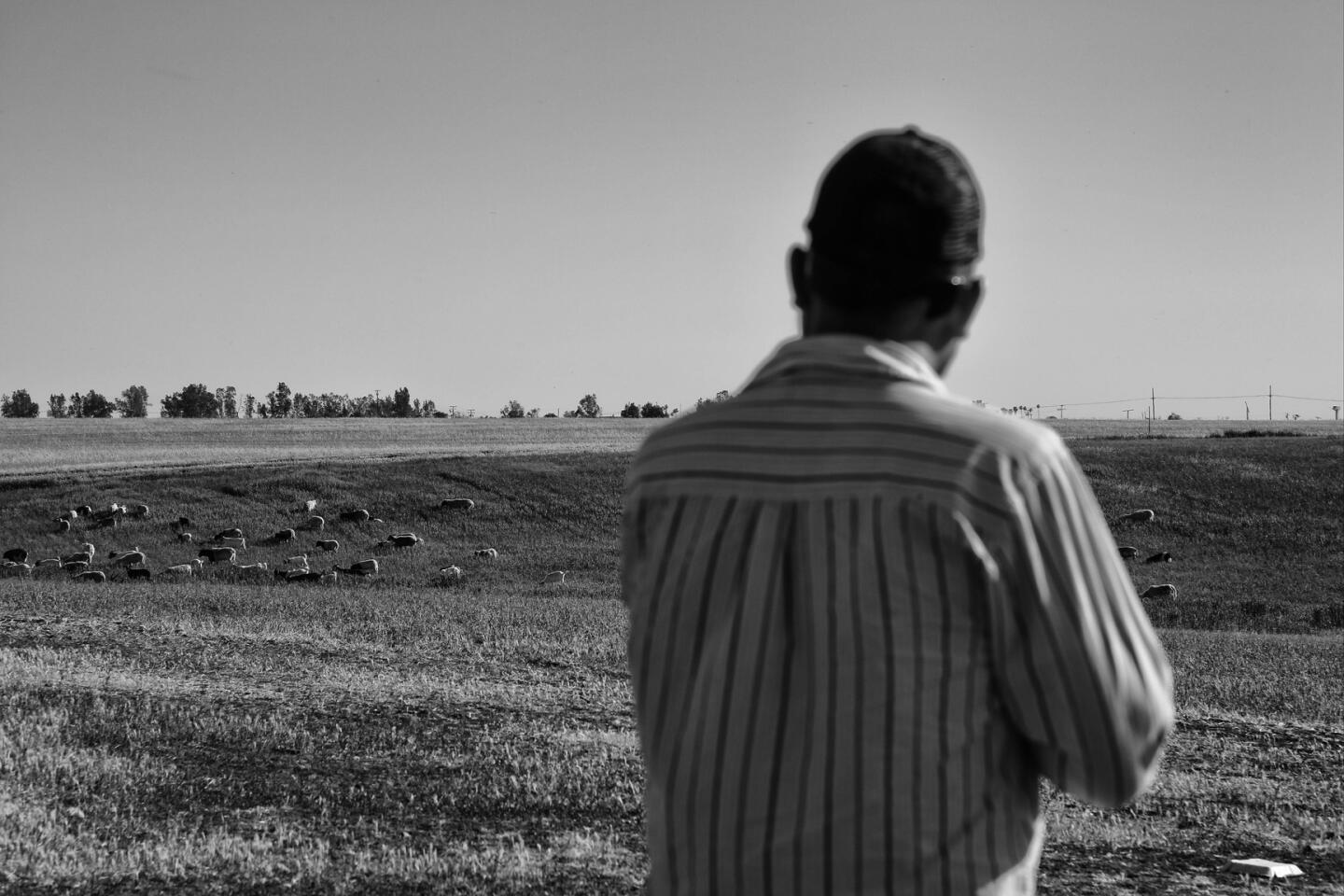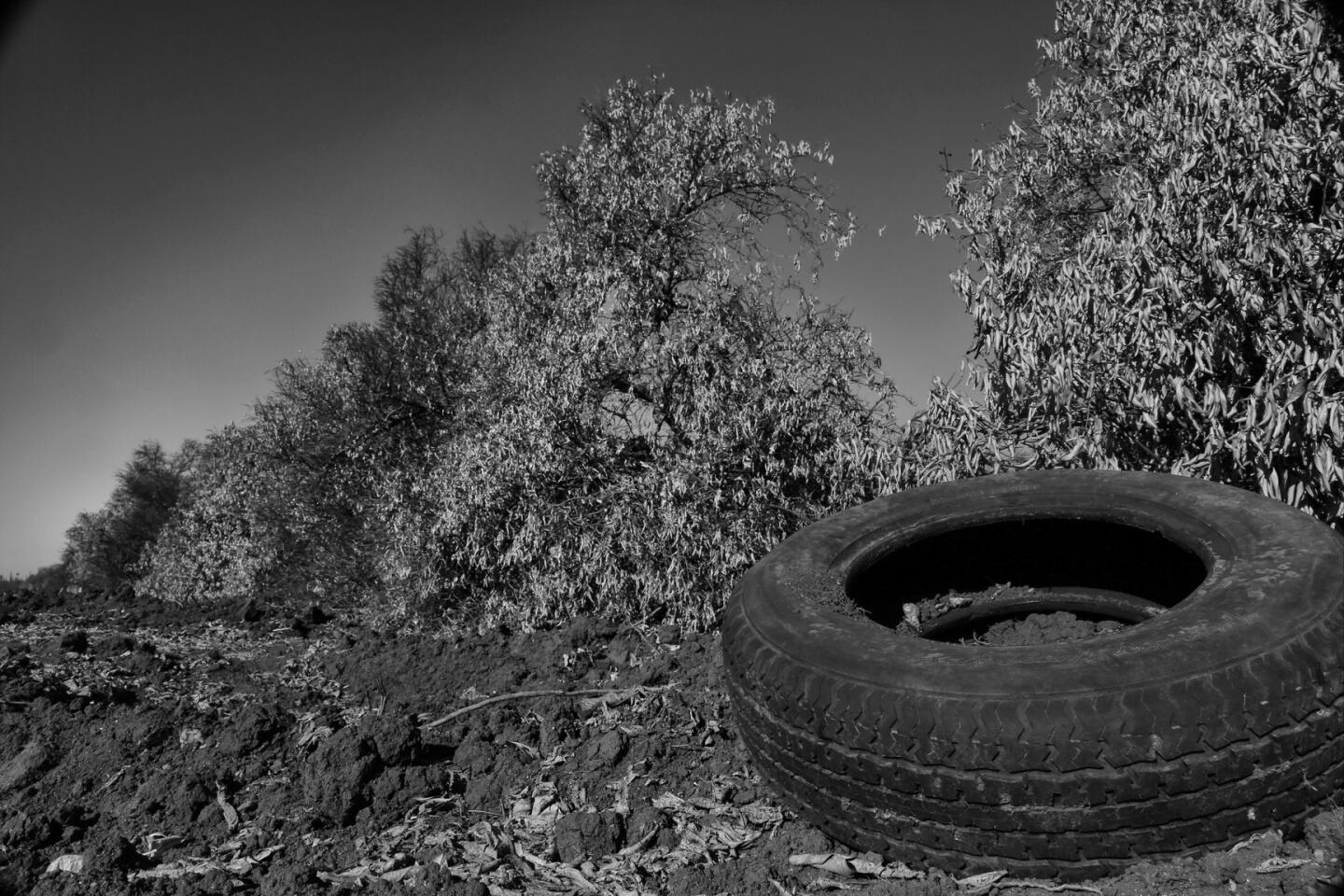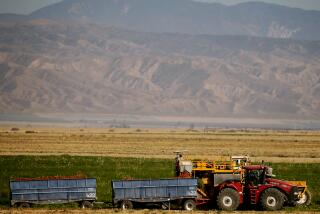Great Read: With his well nearly dry, a farmer draws on his resolve
- Share via
Reporting From POPLAR-COTTON CENTER, Calif. — It was done. Over. No more waiting for rain, hoping for snow.
The 32-year-old farmer in the barber’s chair said his well wouldn’t make it to summer.
“I held on a little longer than some,” Adam Toledo said. “But only the richest will survive now.”
“Bro!” protested Sammy-the-barber. “You’re scaring me.”
Sam Agcoili liked to keep his small shop cheery. Pictures of his lush native Philippines and Hawaii, where he went for his anniversary, hung on the walls. Christian pop music played on the stereo.

<p>Adam Toledo’s well is all but done</p>
It was late afternoon at the tail end of what should have been the rainy season in the fourth year of the California drought. Toledo had started at 3 a.m. cutting spinach for another farmer, paid a quick visit to his mother here in his hometown, and now was on his way to work his own land, about 15 miles away. The haircut was the only time he would sit still while the day’s sun was up.
His wife was working at a Mexican restaurant over in Porterville. Everything they made went into a farm that was dying.
Toledo paid for his haircut and squeezed Agcoili’s shoulder.
“Don’t worry, Sammy. It’s nature. There’s nothing we can do about it,” he said. “Just turn up your praise music.”
Scenes from California’s Dust Bowl
::
Orange blossoms scented the air. White bee boxes were stacked in nut orchards.
Down the road, an orange grove in Strathmore was dead — black moldy fruit clinging to the trees. A farmer’s well had gone dry.
Other groves in this eastern part of the San Joaquin Valley at the foot of the Sierra Nevada were dying because the owners could make more money selling their water to irrigation districts than farming their land. Water — bought and sold — flowed in concrete canals, but rivers were dry.
Sometimes, when you’ve been hanging on for so-so long, you dream of letting go.
— Adam Toledo
The mountaintops should have been bright white against blue sky. There was no white. It was the lowest snowpack on record for California’s greatest watershed.
The Toledo farm sat on a rise on the outskirts of Terra Bella, named “beautiful earth” by early Italian immigrants.
Two dead palm trees marked the drive.
If the losing battle with the drought was taking a toll, Toledo never showed it, not even to his wife.
“He’s never tired. Never angry,” Gricelda, 30, said, her eyes wide with amazement. “I say to him, ‘Aren’t you stressed?’ and he always tells me, ‘Stress is a rich man’s disease. I don’t have time for it.’”
Toledo, feeding their goats, chickens and cow, had to raise his voice to be heard over the farm animals’ greetings.
“If I come home and my wife is sad and my daughters are sad and then I act sad too, what are we going to do? Have a funeral? No!” he shouted. “So, what, we start over. As long as a person is breathing, there’s hope.”
Later, shoveling almond hulls into buckets for the next morning’s feed, he admitted he was tired.
“Sometimes, when you’ve been hanging on for so-so long,” he said, putting down his shovel and stretching his arms overhead, “you dream of letting go.”
::
Toledo figured he could go to the bank and get a loan for a deeper well.
But what if that well ran dry? What if the drought didn’t end?
“There were nights my mind was on fire thinking what to do,” he said.
He could take on greater debt, but then the bank might end up with the land while he still owed money.
“If I lose such a bet, maybe I’m going to turn crazy,” he said. “A lot of people are gambling. And maybe they’ll lose everything. They should set up crisis centers so people don’t shoot themselves in the head.”
For as long as the well had a little water and the bills weren’t piled too high, he was going to keep the farm going.
“It’s not just for me. Behind me is my family and five workers and their families and the animals,” he said.
He used to be a farmworker. In high school and afterward, he picked oranges. There was a couch behind the front door of his parents’ house.
“I would come home so tired. I’d lay down on the little couch and they’d pick me up for work the next day from the exact same spot,” he said, laughing.
He moved on to jobs that required more skill, always working on other people’s farms while saving for his own.
His place used to belong to a man who had sold a landscaping business in San Bernardino and decided to buy a country life with his newfound wealth.
“He didn’t know anything about farming,” Toledo said. “He was just throwing water around. Growing a few strawberries.”
He hired Toledo for a stint during harvest. Toledo took a liking to the self-made man who had risen from gardener to landowner. He started coming around to fix farm equipment and offer advice.
“After four years, he said: ‘I’m done. I’m too tired. Here, just take over the payments,’” Toledo recalled.
He, his father and his brother took on the remaining 25 years of a $3,300-a-month mortgage. It was the first year of the drought.
From the top of his pale goat pasture, he pointed out the lay of the land.
The deep green was his alfalfa, irrigated by a well that was pumping water at a quarter of the rate it had before. The brown-gold was the field of his neighbor who had run out of water months ago. Beyond that were acres and acres of recently planted pistachio trees — a high-investment, high-value crop — on land with a new, deep well.
“We call them ‘petro-dolares’ around here because they belong to the guys with oil money,” he said. “You know what those guys call the nuts running through the machines? Gold.”
A half-mile past the new grove was a small community of about 30 farmworker families.
All their wells went dry over the last two years except for two houses, and they were sharing their water with everyone else.
Toledo considered this a happy story.
“The ones with water left are nice,” he said. “What if they were mean and didn’t share?”
::
By late March, the goat pasture was mostly dirt.
Against a sky swirled with pink and gold and purple-blue, Toledo’s daughters Valeria, 11, and Johana, 10, brought the goats in, riding a quad wider than the two of them put together. They giggled wildly as they bounced to a stop.
“My beauties,” Toledo said. “Are you having fun?”
They had missed a goat. Chiquilin, a border collie mix, streaked against the sunset, rounding up the straggler.
“You have to have a dog to be happy in this life,” Toledo said, watching him run. “I am in the field every day talking to him like a human. Telling him all my worries.”
He was down to having 40 of his 115 acres planted. Running the well for even that patch cost $5,000 to $8,000 a month for electricity. With the money everyone brought in from outside jobs, the farm at best broke even each month.
He was conflicted about irrigating his last alfalfa field.
The water for the fields and the water for the family came from the same failing well.
“Without water to irrigate, there is no farm,” he said. “But without water for the house, there is no life.”
Without water to irrigate, there is no farm. But without water for the house, there is no life.
— Adam Toledo
He was sure that, very soon, someone — or an investment group — would buy his land, dig a much deeper well, plant pistachio trees and maybe make millions of dollars.
“When you come with just the dirt under your fingernails, it’s really hard,” he said. “You can’t climb. You need a push.”
In April, spur of the moment, he told Gricelda to call in sick to the restaurant. He asked his parents to take care of the goats. The girls were on spring break. He was tossing out the rule that farmers with a crop to bring in don’t go on vacation.
They went to Los Angeles to visit relatives. There were family barbecues. They went to Olvera Street and ate hot dogs. Toledo ate two.
They returned on a Monday, and rain was in the forecast for Tuesday.
Toledo had a field of unharvested hay. If it got wet, it would be worth $10 a bale instead of $15.
“I have a plan,” he said. “I am going to keep my face turned this way so I don’t see that field. If it rains, oh, well, we need it.”
It rained. He kept his face turned away from the hayfield and looked at the goat pasture, miraculously green after just one day of rain.
Neither made a difference any longer. The farm hadn’t made any money in four years. The race now was only for the well to not go dry before the end of the school year.
He didn’t know what he was going to do next.
“I have hands and feet and I can work,” he said with a shrug.
He imagines that in 10 years, he’ll drive Valeria and Johana up to this land.
“Maybe it will be all green and nice and full of pistachio trees. I’ll say to them, ‘Do you remember when we were up here just trying-trying-trying? There was a drought. It was part of your life’s adventures.’”
Twitter: @DianaMarcum
More to Read
Sign up for Essential California
The most important California stories and recommendations in your inbox every morning.
You may occasionally receive promotional content from the Los Angeles Times.
